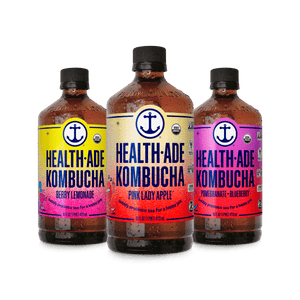
Kombucha | 12 Pack
Fan Favorite Variety Pack
One-time Purchase
49.95

Copied URL to clipboard!
No matter how long it has been since I’ve taken a “first day of school” picture on a sunny September morning, this time of year will always remind me of learning new things (and the smell of new school supplies, of course).
We learn so many things over the years in school, but I think it’s safe to say that there are also so many things we don’t learn! As a Dietitian, I’m often reminded that many things related to food, nutrition, and gut health aren’t common teaching topics unless you commit to a health-specific career.
The good news is that it’s never too late to learn! So, grab your notebooks and let’s dig into some of the basics of gut health.
“I’ve heard of the microbiome, but what is it?”
The microbiome is the genetic material of all of the microbes that live on and inside the human body. Fun fact: we’re mostly microbes! The microbes on and inside our bodies outnumber our human cells ten to one. Bacteria found in the gut are part of the microbiome and play important roles in things like digestion and immune support.
“What are probiotics, prebiotics, and postbiotics?”
Probiotics are live microorganisms that, when administered in adequate amounts, confer a health benefit to the host (that’s you!). Prebiotics are indigestible fibers that ferment in the gut and feed the health-promoting bacteria. Postbiotics are the metabolites of probiotics. In other words, they’re the result of the fermentation processes carried out by microbes in the intestines.
All three of these components depend on each other! Think about it this way…Step 1: Prebiotics are introduced to your GI tract when you consume fiber-containing foods. Step 2: Probiotics can feast on prebiotic fibers. Step 3: Postbiotics are produced as a byproduct of the fermentation process carried out by the beneficial bacteria.
The variety of postbiotics produced in your gut may play a role in strengthening your immune system and reducing digestive symptoms in individuals with inflammatory bowel disease. Research also suggests that certain postbiotics could even help treat antibiotic-associated diarrhea, manage blood sugar levels, and more! (1)
“What gut-friendly practices can I build into my routine?”
First things first, stay away from unnecessarily restrictive diets. Eating enough and aiming to include a variety of foods in your meals and snacks is a good idea for gut health! Speaking of variety, consider adding several fiber-containing foods to your daily intake. Think fruits, veggies, whole grains, nuts, seeds and SunSip. These are your prebiotic friends! If incorporating more fiber into your intake is a new practice for you, take things slow, and don’t forget to drink water along the way.
Alcohol can be a big gut health disruptor, so try to keep your alcohol intake to a minimum. If you need some gut-happy mocktail recommendations, we’ve got you covered! Lastly, try exploring some fermented foods like yogurt, kefir, sauerkraut, and our favorite, kombucha! Fermented foods and beverages are sources of live microorganisms that can add to the microbial diversity in your gut.
Here’s to learning new things this fall and taking care of yourself (and your gut) along the way. Cheers, friend!
Sources:
1. https://www.frontiersin.org/articles/10.3389/fsufs.2022.887642/full